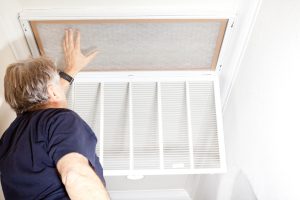Choosing the right air filter for your HVAC system isn’t just about airflow—it’s about protecting your equipment, improving indoor air quality, and keeping your family healthy. With so many filter types, sizes, and MERV ratings available, it can be tough to know which option is best for your home.
Whether you’re looking to reduce allergens, improve efficiency, or simply keep dust at bay, selecting the right air filter makes all the difference. Our team is here to help you with HVAC air filters in St. Clair Shores, MI. Keep reading to learn how to make the right choice for your HVAC system—and breathe a little easier year-round.
Air Filter Ratings
Air filters are rated based on their ability to capture particles of varying sizes. The most common rating system is the Minimum Efficiency Reporting Value (MERV), which ranges from 1 to 16. Higher MERV ratings indicate a filter’s ability to capture smaller particles.
- MERV 1-4: Basic filtration; captures large particles like dust mites and pollen.
- MERV 5-8: Better residential filtration; captures mold spores and pet dander.
- MERV 9-12: Superior residential filtration; captures lead dust and auto emissions.
- MERV 13-16: Hospital-grade filtration; captures bacteria and smoke particles.
While higher MERV ratings offer better filtration, they can also restrict airflow if your HVAC system isn’t designed to handle them. It’s essential to consult with a professional to determine the appropriate MERV rating for your system.
Types of HVAC Air Filters
Choosing the right filter can make a big difference in your indoor air quality. Common filter types include:
- Fiberglass Filters: These are inexpensive and disposable, providing basic protection by capturing large particles. However, they are less effective at improving indoor air quality.
- Pleated Filters: Made from polyester or cotton paper, pleated filters offer better filtration than fiberglass filters. They can capture smaller particles and are available in various MERV ratings.
- Electrostatic Filters: These filters use an electric charge to attract particles. They can be washable or disposable and are effective at capturing small particles.
- HEPA Filters: High-Efficiency Particulate Air (HEPA) filters capture 99.97% of particles that are 0.3 microns or larger. They are typically used in environments requiring stringent air quality control, such as hospitals.
Choosing the Right Filter for Your Home
When selecting an air filter, consider the following factors:
- Allergies and Respiratory Issues: If household members suffer from allergies or asthma, opt for filters with higher MERV ratings to capture allergens like pollen, pet dander, and mold spores.
- Pets: Homes with pets may require filters that can capture pet hair and dander effectively.
- Local Air Quality: In areas with higher pollution levels, such as urban settings, higher-rated filters can help improve indoor air quality.
- HVAC System Compatibility: Ensure that your HVAC system can handle the filter’s airflow resistance. Using a filter with too high a MERV rating can strain your system.
Maintenance and Replacement
Regular maintenance is crucial for optimal performance.
- Check Filters Monthly: Inspect your filters monthly for dirt and debris.
- Replace as Needed: Generally, replace filters every 90 days. However, homes with pets or allergy sufferers may require more frequent changes.
- Professional Inspection: Schedule annual HVAC inspections to ensure your system operates efficiently.
Local HVAC Services That Meet All Your Needs
Our team offers comprehensive HVAC services, including guidance on selecting the right air filters for your home. Our experienced technicians can assess your system and recommend filters that balance air quality and system efficiency.
Contact Charter Home Comfort today to schedule an appointment with our professionals for HVAC service. Old fashioned values with tech savvy results!

